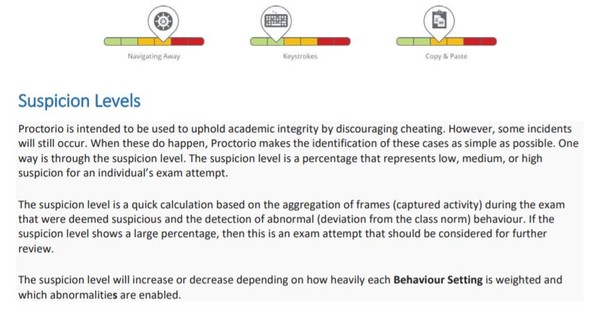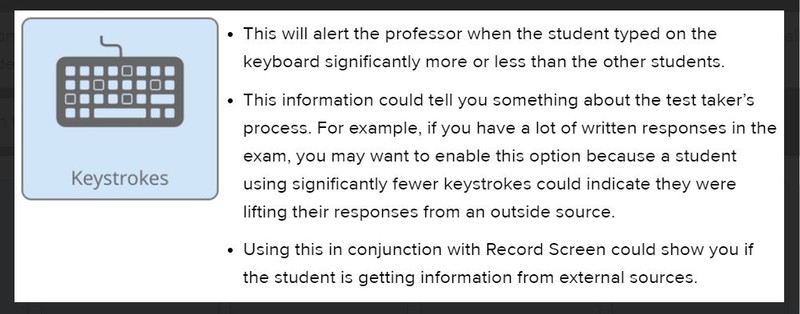Last Updated on 06/11/2020 by TheDigitalHacker
Several university and school students from all around the world have had to give their exams online because of the ravaging coronavirus. Many schools and universities issued notifications, making it compulsory for students to use virtual proctoring software. These software act as virtual invigilators and constantly monitor the student’s work and movements, to capture possible use of unfair means during the examinations.
Such software affects the host systems a lot – the webcam monitors the student’s eye and head movements, the microphone scans for background noise in the student’s room, and an algorithm keeps a record of the test taker’s mouse movements and keypresses. It flags any action that the algorithm deems suspicious, to be later viewed by the class lecturer, or teacher. One such company, Proctario is under the radar of users and students because of its unethical and unfavorable code.
Eric Johnson, a first-year computer science student at Miami University was surprised to learn that two of his professors required him to use the Proctorio software for their classes. He aired his concerns on Twitter and posted a code analysis of the software on Pastebin, only to discover that his IP was banned from using Proctorio’s services. The CEO of the company, Mike Olsen sent him direct messages, demanding that he takes down the post. Johnson has refused and is now waiting to see if the company would take legal actions against him. In the past few weeks, Proctario has taken strict legal steps against critters.

Johnson praises his professors as he says, “If my professors weren’t flexible, I’d be completely unable to take exams. It’s insane to think that a company [or] CEO can affect my academic career just for raising concerns.” Mike Olsen had earlier posted a student’s chat logs on Reddit after questions were raised regarding security issues.
Johnson is just one of the several college students, who are revolting against the use of digital proctoring services, and the aggressive methods used by these proctoring companies in response to those efforts. Students have started creating and signing online petitions, calling for universities all around the world to abandon the use of such tools. Several faculties too sympathize with these pleas, and they too have led a few campaigns with similar motives.
Surveillance at Home
With the explosion of the COVID-19 pandemic, students and educators have had to adopt unconventional methods to teach. Online education involves teaching and learning through video lectures from the comforts of home. Proctoring companies cite studies estimating that over half of the college students are prone to adopt unfair means while answering their papers. They warn that the number of students adopting unethical methods would be very high if they are left unmonitored in their own homes.
Not unlike other tech companies, Porctorio too is not ready to take responsibility for how their software is used. They say that the data saved by the software during exams by the algorithm is not accessed by the company. It is directly shared with the instructor to take steps as he/she deems fit. These companies have taken steps swiftly to prevent developers and others with access to the training material or code from publishing their concerns or disclosing the analytics data.
In an attempt to defend its intentions and the company, Scott MacFarland, the CEO of ProctorU, in his email to Motherboard wrote, “Any plan that calls for schools to just ‘stop using’ proctoring will make cheating more common than it already is, escalating a severe threat to all higher education.”
“We may not love the idea of being on camera every time we visit a bank or go to a convenience store, but no one is suggesting taking them down,” he added.

Studies have indicated that students test takers with high anxiety levels tend to perform poorly, as compared to calm candidates. Students being forced to use proctoring software does make them anxious, and that has an adverse effect on their test scores.
The objection against proctoring software goes beyond the scope of exams. Students might face harassment as the software picks up bedroom talks and other family conversations while they take tests, and stores it. As more evidence emerges about how the programs work and fail to work, critics say the tools are bound to hurt low-income students, students with disabilities, students with children or other dependents, and other groups who already face barriers in higher education.
In petitions by several law students, they claim that ExamSoft discriminates against people of color because facial recognition technology has been shown on numerous occasions to be worse at recognizing people with darker skin tones, and particularly women of color. The California bar exam would require test takers to verify their identity with facial recognition checks eight separate times, according to the petition, and a single failure would end the test.
Ahmed Alamri, an Arab-American who faced similar issues, says, “They aren’t taking into consideration people from underprivileged communities. This sort of online exam is really measuring a person’s generational wealth and not their knowledge of the law.”
Students with Special Needs
Such software, developed by mathematicians and coders, is reducing the student to a mathematical model. They are defining an ideal student body – how it moves, what it does, how it looks, and anything beyond what is defined is considered an abnormality. This leads to unequal scrutiny of people with physical and cognitive disabilities or conditions like anxiety or ADHD,
Proctorio and other proctoring companies have expressed their disagreement with this assessment. Olsen says, “The biggest thing is that we’re not making any sort of academic decisions, we’re just providing a quicker way [for teachers] to review places in the exam based on the things they’re looking for,” It is completely dependent on the teachers what they plan to decipher as an abnormality. When teachers choose to use exam-monitoring software like Proctorio, it is often without guidance or restrictions from the school’s administration.

In March, when students at the University of California Saint Barbara approached faculty members, concerns were raised whether ProctorU would share student data with third parties. The faculty asked UCSB to terminate its contract with the company and discourage professors from using similar services. An attorney on behalf of ProctorU responded by threatening to sue the faculty association for defamation and violating copyright law, especially because the association had used the company’s name and links to its website.
Though ProctorU never filed a lawsuit against the UCSB faculty association, the threat left a chill on professors’ willingness to discuss matters related to the software.
Holt, one of the faculty members who first raised questions about proctoring software, declined to talk about the software, or what they had to face from the company. But in general, she remains worried about the spread of proctoring tools on campuses. “We must do better than subjecting our students to surveillance and violations of their privacy,” she said. “We must do better than allowing algorithmic policing through biometric surveillance as the new normal for education.”
Students from Australian National University have started a petition to condemn the use of Proctorio for their Semester end exams.










